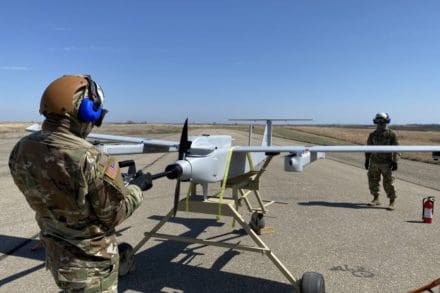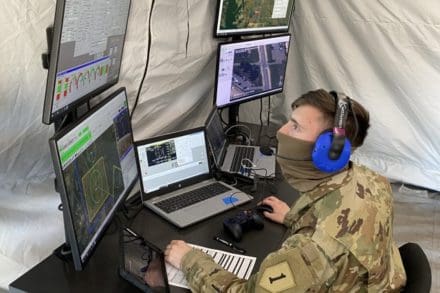FORT RILEY, Kan. – The 1st Armored Brigade Combat Team, 1st Infantry Division conducted the first Soldier-operated flight during the Army Futures Command-directed Future Tactical Unmanned Aircraft System capabilities assessment, April 7, 2020.

Announced in December 2019, the assessment will evaluate selected unmanned aircraft systems to define the capabilities needed in the next generation UAS for brigade combat teams. Data gathered during the assessment will be critical to determining the requirements for the RQ-7 Shadow replacement.
Future Unmanned Aircraft Systems is a signature effort within the Army’s Future Vertical Lift Modernization priority. The Program Executive Office for Aviation’s Unmanned Aircraft Systems Project Office in collaboration with Army Futures Command is leading the capabilities assessment.
The “Devil Brigade” is the first U.S. Army Forces Command unit to demonstrate one of the four vertical take-off and landing unmanned aircraft systems procured for the assessment.

Assigned the Arcturus UAV JUMP 20, it is the largest of the selected systems weighing 210 pounds with an 18-foot wingspan. Despite the size, its reduced acoustic signature compared to the Shadow is appreciated by the entire crew. “We’re used to screaming at each other and having to use radios in order to communicate,” said Spc. Christopher McCoy, a crew chief assigned to 1st Engineer Battalion, 1st Armored Brigade Combat Team. “You can stand right next to this aircraft and not even raise your voice,” said McCoy.
According to Spc. Nicholas Miller, an unmanned aircraft systems operator also assigned to 1st Engineer Battalion, the JUMP 20 maintains the ability to launch and recover from a confined area with minimal ground support equipment. “Currently, we need a runway for launch and recovery of the Shadow. With the VTOL system on the JUMP 20, we don’t need any of that, we’re working with half the equipment,” he said.
The extended endurance of the system allows multiple operators to take turns training on the payload at altitude, while a second aircraft conducts repeated launches and recoveries to train operators and crew chiefs on critical modes of flight.
Over the next five months, the Big Red One Soldiers will operate the system as a surrogate for their RQ-7 Shadow, performing similar tactical tasks for the BCT, but with the added vertical take-off and landing capability and control while on the move. The assessment utilizes a crawl, walk, run mentality, progressing through operator and collective training, then culminating in brigade level field training exercises and a Combat Training Center rotation.
Under increasing COVID-19 precautions, it was uncertain whether the assessment would remain on schedule. Maj. Gen. John Kolasheski, commanding general of the 1st Infantry Division determined the assessment could continue with proper mitigations. The Army is following CDC and DoD guidelines to combat the spread of COVID-19.
The four other FORSCOM units participating in the assessment are assigned the Martin V-Bat, Textron Aerosonde HQ, L3 Harris FVR-90, and a second Arcturus UAV JUMP 20 are scheduled to begin in the coming months. These assessment schedules are under regular re-evaluation as COVID-19 conditions change.
For updates throughout the FTUAS assessment, visit: www.dvidshub.net/feature/FTUAS
By Sarah Tate

